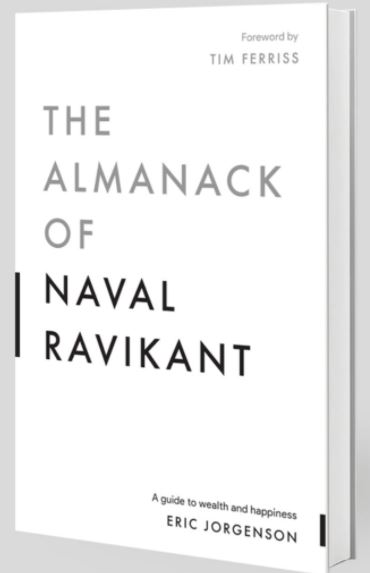Naval Ravikant is an entrepreneur and investor. He started his business life as an entrepreneur and invested in multiple successful companies. The Almanack of Naval Ravikant is a curated collection of tweets, organized into a book. The book helps you understand his thoughts on building wealth and happiness, and his philosophy. Here is a Book Summary:
Broadly divided into two parts:
The first part deals with Business and Learning
The second part deals with Happiness and Life.
Here is a Book Summary of The Almanack of Naval Ravikant.
The Book Summary is written to highlight the key lessons, we would still suggest you go ahead and read the book.
Understand that you want to be wealthy and not rich. Wealth is when you have assets that earn you money when you sleep. Making money is a skill you learn, just like many other skills in life. If you want to get rich, you will not do it by renting your time alone. You must own equity, a piece of the pie. Owning a piece of pie also makes people more invested and act better.
Specific Knowledge
Specific Knowledge is a thing, something people around you consider a skill, but you may not. It is not something anybody can be trained for.
Power of Compounding
This book talks about the Eight Wonder of the World i.e understanding The Power of Compounding.
Compounding works not only for money alone, but in all aspects of life, knowledge, wealth and finance.
When you find the right thing to do and the right people to do it with, invest deeply.
Being deeply invested in something is the way to achieve mastery and this is only possible for a few things.
To make a fortune, you need leverage, leverage comes from capital, people or products with no marginal cost of replication. Code, media and books are such leverage where you don’t need anybody else’s permission to replicate. The more risk you take, the greater your accountability, specific knowledge and leverage need to be
Making a fortune also comes with risk of failure. This is also where your accountability matters, as failures are tolerated as long as you acted in good faith.
It is important to prioritize and focus, ask yourself three questions:
- Where to live
- Who to be with
- What to do.
Valuing your time is critical. Value your hourly rate, and save time at that rate. You have to value yourself right, because you will never be paid more than you think you’re worth
Learning is perpetual, reading and learning are the only ways to make mental models. It is easier to do and learn than to watch someone else do/not do and learn.
If you have two choices, choose the ones that has more short-term pain. If you have multiple options and can’t make up your mind, then the answer is no.
Reading is essential to success. If you can read science, mathematics or philosophy for 1 hour everyday, you will set yourself up for success in 7 years. If you don’t find a book interesting, drop it. There is so much to read out there you needn’t feel bad about not reading a book cover to cover.
The most important things in life are wealth, health and happiness, and the importance is the reverse order.
How much of your day do you spend doing out of obligation and not interest. Find work that feels like play.
Nobody can compete with you if you spend time doing work that feels like play. You can put in all the hours you need and feel like without it seeming like work. It helps to find work that feels like play but playing games doesn’t help. Naval lives from moment to moment. He believes he has seen the through these games and doesn’t feel the need to play them anymore
Happiness is when a sense of something missing is removed from life.
It is existing in the present.
A lot of screen related activities usually mean reduced happiness. True happiness comes from non-screen activities. Happiness is embracing the present, the way it is. The true winners of the game are the ones who can leave it altogether. They have great internal and mental control and don’t need anything from anything else
When you face a situation, there are three things you can do:
1) Accept it
2) Change it
3) Leave it.
You have to aspire to be knowledgeable about certain things, so that you’re paid for your knowledge and judgement. Small differences in judgement can and are amplified. Demonstrably better incremental judgement will be rewarded better.
While it is important to put in time, judgement is more important. The direction you’re moving in is more important than how fast you’re moving, pick the right direction
Being the best at what you do usually means the opportunity will come find you
Business networking for the sake of networking isn’t worth very much. Being the best at what you can means both opportunities and people will seek you out
You can be well read and not very smart, this is because you’re learned or read things in the wrong order.
Meditation and having free time help greatly.
You’re not going to get a great idea when you’re running around stressed and running around. Also, if you can just sit for thirty minutes and be happy, you are probably successful
Naval Ravikant talks about how he was successful, not just in his business ventures but in life too.
This was a book I enjoyed reading. It felt like a quick and easy read. A lot of what Naval Ravikant wrote and talks about feels simple and something that we can follow. I believe this is a book that we can all read and learn something from.
Hope you enjoyed this Book Summary of The Almanack of Naval Ravikant.

You can download the free pdf from here
Go Back to our homepage for more content.